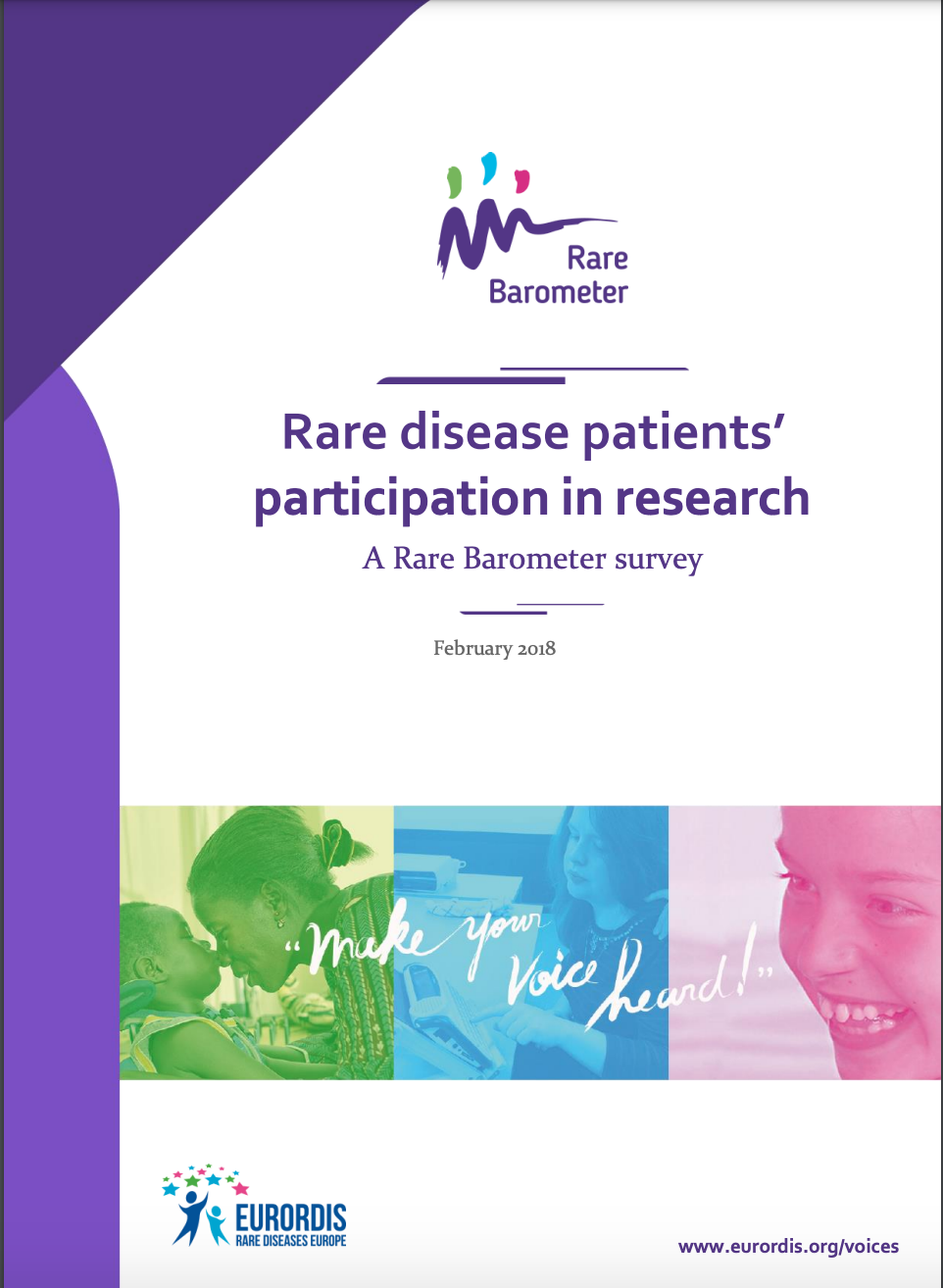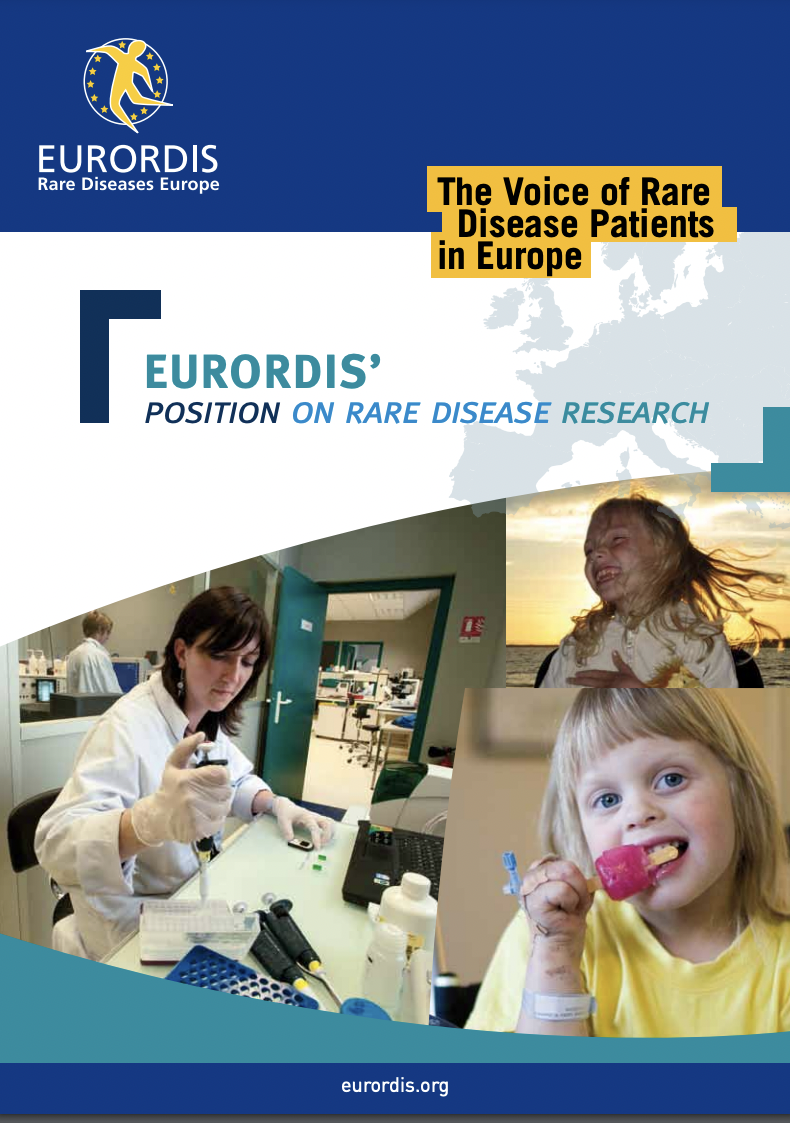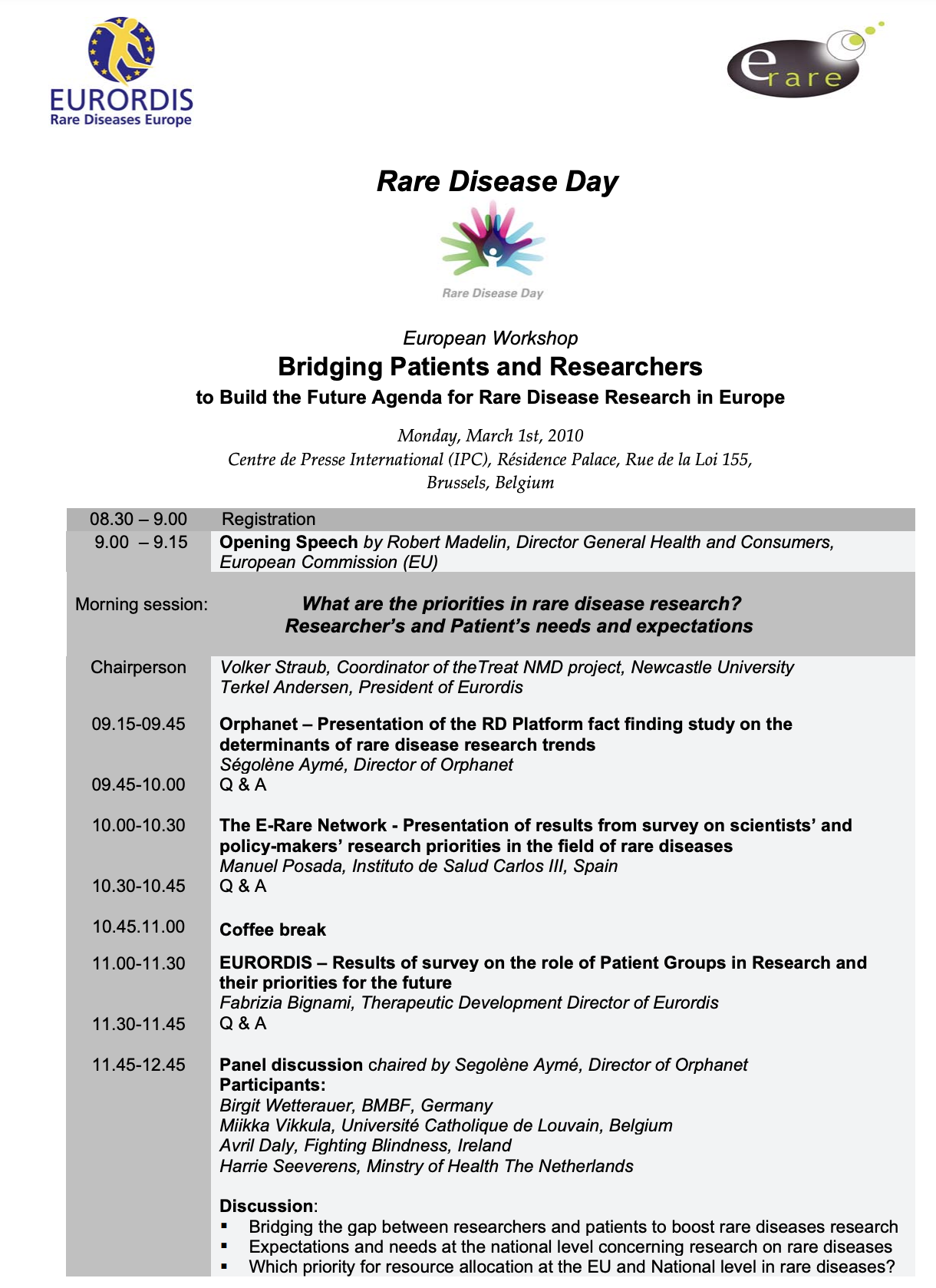Research
Why is research a priority for people living with a rare disease?
Research leads to better understanding of rare diseases, quicker and more accurate diagnosis, innovative treatments and cures, and better health care. It represents hope for the 30 million people living with a rare disease in Europe and their families.
While improvements have been made in the past decades with dedicated public funding and coordinated actions at the EU level, rare disease research faces political and practical obstacles such inadequate funding, small patient populations for clinical trials and a lack of coordinated resources for patient registries. This translates into insufficient knowledge on these diseases and delays in both diagnosis and the development of much-needed treatments.
Patients and researchers need collaborative efforts to translate basic science into clinical application, address unmet needs and find new ways of diagnosing, treating and curing rare diseases. The Winter School was a precious opportunity to take proactive steps in research discussions for my disease. It gave me the tools to promote the application of advances in novel technologies, comprehensive data collections and innovative and secure ways of accessing and sharing data.
Michela Onali, Winter School 2019 Alumni
How you and your patient organisation can get involved in research?
People living with a rare disease can be directly implicated in each step of the rare disease research process. For example, you could: advocate for research when there is none by connecting with researchers working on similar diseases; help researchers design studies that reflect your needs; start or contribute to a registry so that researchers can find patients’ data; and participate in research activities. Often patient organisations can support researchers to recruit patients and encourage them to donate samples to boost research.
Patient representatives can participate in the EURORDIS Winter School on Scientific Innovation and Translational Research to become valued partners in rare disease research by developing their knowledge and capacities in this area. All EURORDIS Open Academy trainings including the EURORDIS Winter School are free and provided through a blend of e-learnings and webinars.
About research
Research on rare diseases covers a whole spectrum – from basic research (understanding of disease mechanisms in laboratories), to pre-clinical (development of disease models including animal and cell-based systems to test potential therapies), to translational (how to make research results translate into real benefits for patients), to clinical trials. Scientific advancements from rare diseases research also contribute to progress for more common diseases and the health outcomes of individuals.
Rare diseases are a priority area for EU research funding. Major investments have been devoted to rare disease research through EU research and innovation programmes, and in recognition of the added value of cross-country and multidisciplinary cooperation in this field.
The European Commission and EU Member States have supported several initiatives to improve rare disease research including: the International Rare Diseases Research Consortium (IRDiRC), past projects like EPIRARE, TREAT-NMD, RD-Connect and RARE Best Practices, and ongoing initiatives such as the European Rare Diseases Registries Infrastructure, Solve-RD, Orphanet, the European Reference Networks and European research infrastructures such as BBMRI and ECRIN.
But there is still work to be done as most rare diseases lack effective and curative treatments and unmet medical needs of people living with rare diseases are still vast.
The major recent EU effort to coordinate and promote rare disease research is the European Joint Programme on Rare Diseases, to develop an ecosystem to allow a virtuous circle between research, care and medical innovation.
EURORDIS objectives in the area of research:
- Objective one: Promote cross-border collaboration on rare disease research.
- Objective two: Contribute to the development of new and optimised diagnostic tools and understanding of diseases.
- Objective three: Promote and facilitate patient engagement in rare disease research.
At a glance: related topics
- Diagnosis
- European Reference Networks
- EU rare disease policy
Our work
Advocate
Rare diseases are a prime example of a research area that can strongly benefit from coordination and collaboration on a national, European and international scale.
The patient community in Europe, supported by EURORDIS, has effectively advocated for increased European cooperation in research on rare diseases. With our members, EURORDIS has also promoted the need for rare disease research and budget as a priority at the national level, in particular through rare disease national plans.
As a result, funding opportunities for research have increased in recent decades. Between 2007 and 2017 the European Commission (EC) invested over 874 M€ in research on rare diseases. The EU Orphan Drug Regulation has also provided incentives (such as market exclusivity) that encourage companies to invest in rare disease research. However, there remains a lack of research to cover every one of the 6,000+ rare diseases.
EURORDIS promoted rare diseases as a research priority in EU research framework programmes such as Horizon 2020 and in the upcoming Horizon Europe 2021-2027, and played an instrumental role in the creation of the International Rare Diseases Research Consortium (IRDiRC), European Joint Programme on Rare Diseases and the European Reference Networks (ERN). EURORDIS also created an ePAG Transversal Working Group on Research and Registries to develop ePAG patient advocates’ understanding on relevant ERN clinical and basic research topics so they are informed when representing patients’ in their respective ERN.
EURORDIS continuously identifies specific priorities for advocacy work related to research based on members’ preferences and findings of Rare Barometer surveys. These priorities include, for example, newborn screening and sharing of patients’ health and genetic data, among others.
The EURORDIS Position Paper on Rare Disease Research set out the ethical, social, economic and scientific grounds of rare disease research and shaped research priorities.
Partner
EURORDIS advocates to make sure that patients are full and valued partners in the design and development of research initiatives.
EURORDIS facilitates the engagement of patient advocates in rare disease research projects and infrastructures and also represents patients in various research forums. Patients must no longer solely reap the benefits of research; the goal is that they are empowered and valued partners from the beginning to the end of the research and development pathway.
For example, EURORDIS:
- Coordinates the Community Engagement Task Force of the Solve-RD project, a multi-stakeholder group made up of patient representatives as well as experts active in initiatives dedicated to the undiagnosed and rare disease community.
- Co-initiated, participates in, and represents European rare disease patients within the consortium assembly and patient advocacy constituent committee of the International Rare Disease Research Consortium (IRDiRC).
- Is a core member of the governance committee within the European Joint Programme (EJP) on Rare Diseases ensuring that patient needs and priorities are integrated within the different activities of this large programme. EURORDIS has advocated to make it so that patient organisations can now be official partners in research consortia and received funding through research calls that are part of the EJP.
- EURORDIS also represents the voice of rare disease patients in several networks, including the BBMRI-ERIC (Biobanking and Biomolecular Resources Research Infrastructure – European Research Infrastructure Consortium) Stakeholder Forum and the Rare Diseases Global Open FAIR Implementation Network (RDs GO FAIR).
- Within the RD-Connect project (2012 – 2018) EURORDIS also led patient engagement activities to achieve the following objectives:
- Development of best practices on rare disease research that reflect patients’ interests (related to the use of databases/registries, biobanks and omics databases across global networks of clinicians and researchers).
- Engagement with all relevant groups of stakeholders including patient organisations and patient groups, clinical and research networks, legislators and policy makers, as well as the pharmaceutical industry.
- Collection of new knowledge on patients’ experiences and expectations regarding the linking of medical and personal data on rare diseases at the European and global level.
In a 2017 survey of over 3,000 people living with a rare disease carried out through Rare Barometer Voices, the EURORDIS survey programme, more than 1/3 of rare disease patients surveyed declare having already participated in a research study. Respondents also believed the lack of public funding as the main obstacle to rare disease research.
Empower
Through the EURORDIS Winter School on Scientific Innovation and Translational Research and the EURORDIS Summer School on Medicines Research & Development (both EURORDIS Open Academy programmes), rare disease patient representatives become empowered advocates by learning about key aspects within the rare disease research environment and opportunities to get engaged in rare disease research.
Our impact
450+ alumni (patients & researchers)of the EURORDIS Summer School on Medicines Research & Development since 2008
Creation of two new capacity-building programmes in the areas of research since 2018 - the EURORDIS Winter School on Scientific Innovation and Translational Research and the EURORDIS Leadership School on Healthcare & Research
Contribution to the creation of the European Joint Programme on Rare Diseases and the International Rare Diseases Research Consortium (IRDiRC)
Contact the EURORDIS Team
For more information, please contact
Virginie Bros-Facer, EURORDIS Scientific Director
virginie.bros-facer@eurordis.org




